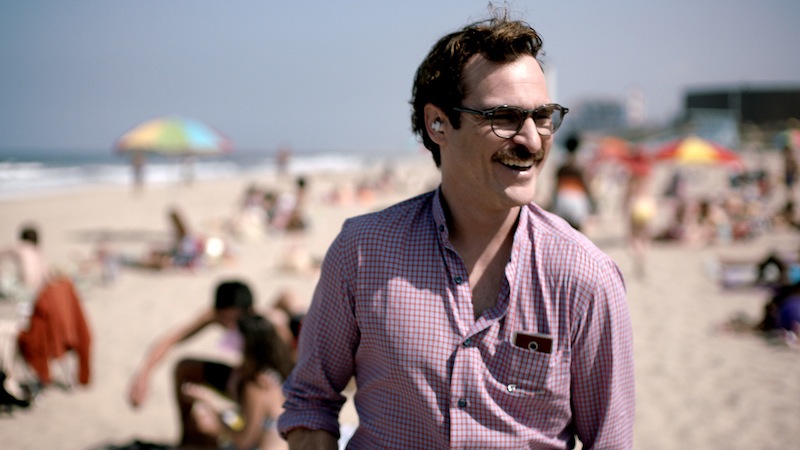
Romance movies typically focus on a conflict surrounding a couple. Some introduce a third or fourth person to confuse and complicate things for said couple’s success. Director Spike Jonze’s “Her” is a film about one man and his significant other: his fake, operating system girlfriend. Or is it fake? Can someone have a real relationship with something without a body, tailored to fit his/her exact desires exactly? What even constitutes a real relationship? “Her” takes a seemingly simple premise and creates a complicated, interesting story about relationships, loneliness and technology’s place in our world by asking these questions.
Waning off a bad breakup with his lifelong friend and wife, Theodore Twombly (Joaquin Phoenix) picks up a new operating system that includes artificial intelligence capable of communicating like a person. It doesn’t take long for lonely Theodore to fall in love with his computer’s artificial intelligence, named Samantha (voiced by Scarlett Johansson). Their ensuing relationship becomes increasingly complicated as Samantha’s program evolves and learns about what it feels like to be human and Theodore discovers the hardships of dating a computer.
Even though for a majority of the film the only visible speaking character is Theodore, it’s incredible how alive the relationship feels. Phoenix shows a range range of feelings from depression, to happiness, to confusion. Although her face is never seen, the same applies to Johansson. You can just tell by her voice how the artificial intelligence is feeling, and it helps that the voice is always presented as clear and audible.
The film successfully presents Theodore as a lonely person, and it’s equally good at connecting the audience with the protagonist. Whenever he starts a monologue about his past, and his failed relationship, the camera focuses in on his face – then suddenly cuts to silent scenes of what he’s thinking about. Because the audience is strictly following Theodore, the film does a good job at evoking empathy from the audience. Early on in the film, life seems to draw on for Theodore, consisting of nothing but him working, going home, playing video games and moping about all of it.
“Her” is also an amazing period piece for a generation that hasn’t even happened yet. The film takes place in the near future. The culture, fashion, technology, art and setting presented feels incredibly logical if we assume it is of the coming generation. Samantha could easily be an incredibly advanced version Siri from Apple’s iPhone.
The film feels incredibly comfortable in the setting. Fashion trends are familiar yet vaguely futuristic and are easy to identify, and it actually feels like we could be wearing what they do in the film in 15 to 20 years. The film takes place in Los Angeles, but in the fictional future it’s even more overwhelmingly urban. During scenes in the city, it’s literally endless, and the number of massive skyscrapers is doubled.
The cinematography, directed by Hoyte Van Hoytema, serves almost entirely to put us into the mind of Theodore. When he’s depressed or thoughtful, there are a lot of long, close shots of him, interjected with short clips of his past, as if he’s lamenting on it. There are also occasional wide shots of just him alone to emphasize his loneliness. However, when he travels the city with Samantha, the camera opens up, showing more of the world around him. Regardless of the exceptions and what mood he’s in, Theodore gets a vast majority of the screen time alone. That’s understandable, of course, because his most common companion is only experienced through voice. The audience is supposed to follow Theodore and his thoughts, so the editors and cinematographers show him as often as they can without it getting stale.
The film also has a beautiful color pallet. The colors pink, orange, white, and grey are used often. The former two are warmer colors, and connotated with love in pink’s case, and they are used beautifully with the whites and greys of the futuristic city and architecture.
“Her” begins as a classic romance tale with a unique spin, but ends up exploring the idea deeply and thoroughly. It is a beautiful, thought provoking sci-fi, but more impressively a fresh and relevant romance. The film asks questions about the hypothetical relationship you might have had yourself, and asks some you don’t expect, and those questions can be relevant to relationships and people now, even if we don’t have hyper intelligent operating systems – yet.
“Her” is nominated for five Oscars: Best Motion Picture, Best Original Score, Best Original Song, Best Production Design, and Best Original Screenplay. In this reviewer’s opinion, “Her” deserves the the award for Best Picture and Best Original Screenplay.
“Her”
2 hours, 6 minutes
Rated: R for language, sexual content and brief graphic nudity
Directed by Spike Jonze
Starring: Joaquin Phoenix, Scarlett Johansson, Amy Adams

